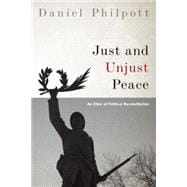Winner of the 2013 Christianity Today Book Award in Missions / Global Affairs
Winner of the Aldersgate Prize Honorable Mention
Winner of the 2014 International Studies Association International Ethics Section Book Award
In the wake of massive injustice, how can justice be achieved and peace restored? Is it possible to find a universal standard that will work for people of diverse and often conflicting religious, cultural, and philosophical backgrounds?
In Just and Unjust Peace, Daniel Philpott offers an innovative and hopeful response to these questions. He challenges the approach to peace-building that dominates the United Nations, western governments, and the human rights community. While he shares their commitments to human rights and democracy, Philpott argues that these values alone cannot redress the wounds caused by war, genocide, and dictatorship. Both justice and the effective restoration of political order call for a more holistic, restorative approach. Philpott answers that call by proposing a form of political reconciliation that is deeply rooted in three religious traditions--Christianity, Islam, and Judaism--as well as the restorative justice movement. These traditions offer the fullest expressions of the core concepts of justice, mercy, and peace. By adapting these ancient concepts to modern constitutional democracy and international norms, Philpott crafts an ethic that has widespread appeal and offers real hope for the restoration of justice in fractured communities. From the roots of these traditions, Philpott develops six practices--building just institutions and relations between states, acknowledgment, reparations, restorative punishment, apology and, most important, forgiveness--which he then applies to real cases, identifying how each practice redresses a unique set of wounds.
Focusing on places as varied as Bosnia, Iraq, South Africa, Germany, Sierra Leone, Timor-Leste, Chile and many others--and drawing upon the actual experience of victims and perpetrators--Just and Unjust Peace offers a fresh approach to the age-old problem of restoring justice in the aftermath of widespread injustice.








